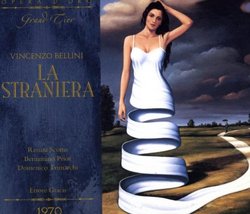THE BEST STRANIERA
OperaLover | Fort Lauderdale, FL | 01/03/2010
(5 out of 5 stars)
"Renata Scotto must be credited by almost single handedly reviving this opera, having performed this opera in three productions specially mounted for her: Palermo in 1968, Venice in 1970, and Edinburgh in 1972. The last time this opera had been produced was in 1954, before that in 1935 with Gina Gigna. Callas, Gencer, Sutherland, etc. never got around to Straniera, although Callas famously was studying the score when she first met Onassis. Scotto should be credited not only for championing Straniera but also for singing Capuletti all over the world. In my opinion, she was for Bellini what Gencer was for Donizetti. There are now, gratefully, sound documents of all three of these productions with Scotto. By far, this in-house recording from La Fenice in Venice is the best of the three. She is in stunning voice, avoiding almost all squalliness, executing trills and effortless coloratura. Quite significantly she nails the final C# in the final cabaletta, capping this triumphant performance in a way that alluded her in some other performances. [Note that Caballe doesn't attempt this interpolated note in her performance.] We are lucky indeed that we have the opportunity to compare Scotto with Caballe's concert performance with the American Opera Society in NYC in 1969. As one would expect from these two great artists in their prime, Caballe is consistently beautiful and far from placid. Moreover, she embellishes the second verse of the the cabaletta in the great final scene. One can appreciate Caballe's spectacular instrument as always, but to hear Scotto rip into that final cabaletta as if her life depended on it is a thrill completely unlike Caballe. The difference is not just one of temperament but also of Scotto's incomparable gift of melding the text to the music. Surely both artists leave important documents of their Straniera, but it was Scotto, in the theater, who paved the way for other performances by Suliotis, Stapp, Aliberti, Fleming and, finally, the first studio recording on Opera Rara with Patrizia Ciofi."


 Track Listings (15) - Disc #1
Track Listings (15) - Disc #1